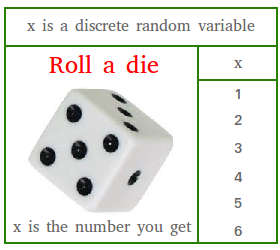Discrete random variable
Before giving a definition for discrete random variable, let us define what a random variable is.

A random variable is a variable that has exactly 1 numerical value and this value is determined by the outcome of a random experiment.
For example, the number of vehicles someone owns is a random variable. To find out, you will need to randomly pick people and ask. Suppose you ask 200 people and 40 people say that they don't own a car, 100 people say they own 1, and 60 people say they own 2.
Let x be the number of vehicles owned by someone selected randomly. Then, based on our result, x could be 0, 1, or 2.
Since the value of x depends on the outcome of a random experiment or asking people randomly, x is called random variable or chance variable.
What is a discrete random variable then?
A random variable that assumes values that are distinct and countable is called discrete random variable.
Why are the values distinct? Using the example above, someone can either own 0 vehicle, 1 vehicles, or 2 vehicles. These values are clearly distinct or different. 1 is not the same as 0, 1 is not the same as 2, and 0 is not the same as 2.
Why are the values countable? It is because we can count them : 0, 1, and 2. There are 3 different values and we were able to count without any problems.
Other examples of discrete random variables
- The number of customers visiting a store during any given hour.
- The number of TVs a person owns.
- The number you get when you roll a die.
- The number of tails obtained in three tosses of a coin.
- The number of auto accidents that occur in a city during a week.
Notice that the number of customers visiting the store will give distinct values. The number of people visiting could be 0, 1, 2, 3, 4, 5, ... and once again we can still count.
Notice also that if you toss a coin 3 times, you could get 0 teal, 1 tail, 2 tails, or 3 tails.
In our example above about number of vehicles someone owns, we found 3 distinct values {0, 1, 2}. This is easy to count since we are dealing with a finite number of values.
A random variable can still be discrete with infinitely many values as long as we can count these values or create a list.
For example, Let x be the number of customers visiting a store forever and ever
This list is very very big, but the list is still countable if you could live forever. This will of course take you forever and ever to count, but you will be able to count if you never die!
A discrete random variable either has a finite number of values or a countable number of values even if it takes eternity to count.